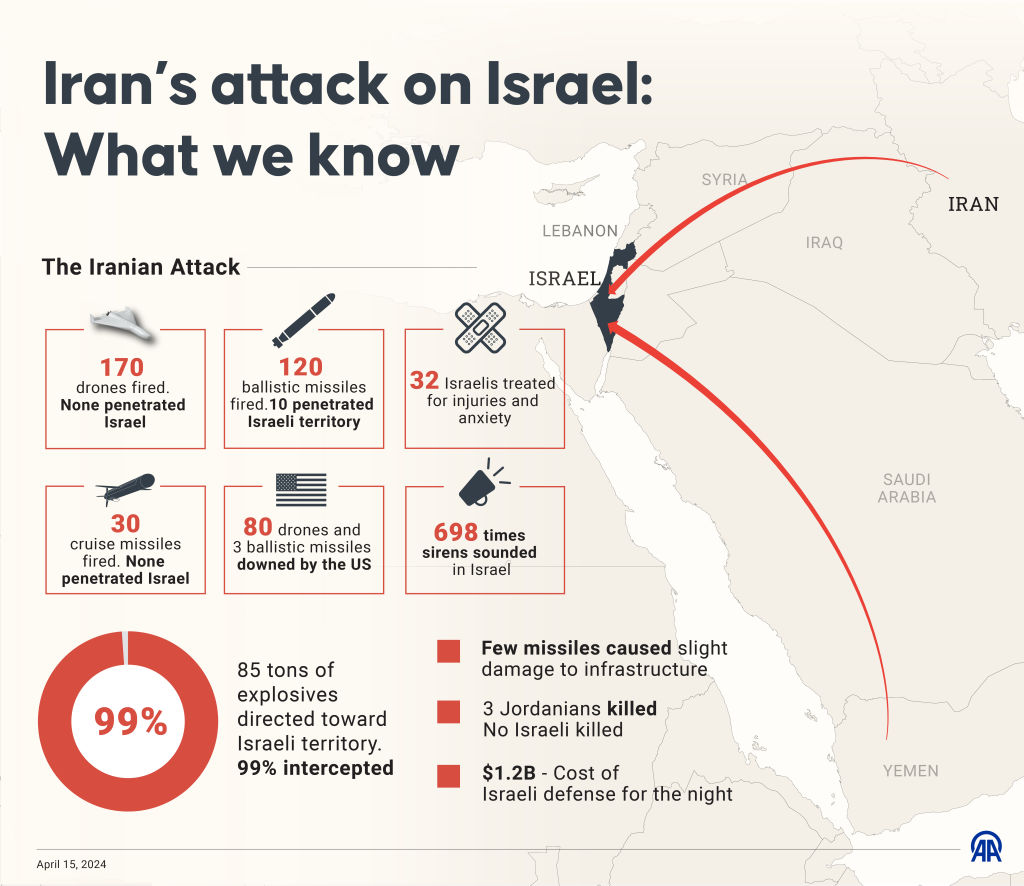Israel’s leaders met today during a war cabinet meeting to discuss the country’s response after Iran launched a combination of 170 drones, 30 cruise missiles, and 120 ballistic missiles towards Israeli soil in the early hours of Sunday morning. It was the first time the Islamic Republic, long hostile to the Israeli state, directly attacked Israel after decades of proxy conflict.
Iran says that its attack was launched in response to an Israeli strike Apr. 1 on an Iranian consulate in Damascus, Syria, which killed a senior individual in Iran’s Islamic Revolutionary Guards along with eight other officers. So far, Iran’s attack seems to have caused minimal damage. No deaths have been reported, though one 7-year-old appears to be in life threatening condition after shrapnel from an intercepted Iranian missile fell directly on her home.
Israel had support from American, British, and French partners who helped it thwart “99% of Iranian aerial threats,” IDF spokesperson Daniel Hagari said. Jordan also intercepted some of the Iranian projectiles that flew over its territory, despite fiercely criticizing Israel’s war in Gaza, which has killed at least 33,00 people including 13,000 children.
Read More: Biden Will Meet With National Security Team as U.S. Pledges ‘Support’ for Israel Against Iran

International Pressure
The U.S. has urged Israel not to retaliate to avoid escalating the situation into a broader regional war. “Slow things down and think through [how to respond],” Biden was quoted saying to Netanyahu according to a report from the Washington Post. He also told Netanyahu that Israel should be satisfied with its successful response and to leave it at that. “You got a win. Take the win,” Biden said according to Axios. Leaders in France and Britain have called on Israel to restrain itself, fearing the destabilizing consequences of a broader war.
H.A. Hellyer, a senior associate fellow at the Royal United Services Institute, says that Israel’s response will be heavily based on whether or not the U.S. will penalize them for acting too strongly. “[It depends on] do they think that the United States has their back and will not penalize them,” says Hellyer. “The reality is that the United States has tremendous leverage over Israel and has so far refused to use it.”
Israel receives approximately 68% of its foreign-sourced weapons from the U.S. in addition to at least $3 billion in military aid per year. The U.S. appeared to pause Israel’s actions in Gaza for the first time last month when President Biden refused to greenlight an Israeli military operation in Rafah, Gaza’s Southernmost city, without guarantees that Palestinian civilians would be protected.
Israel’s Internal Politics
Nevertheless, Netanyahu faces strong pressures from Israel’s right-wing parties to retaliate against Iran. They argue that if Israel does not respond harshly, there will be nothing to deter the Islamic Republic from striking again and severely disrupting the lives of Israelis. “We must respond… so that the rockets from Iran won’t become routine like the rockets from Gaza,” Galit Distel Atbaryan, an Israeli parliament member who is part of Netanyahu’s Likud party, said on Israeli television. Intercepting Iranian missiles and drones is extremely financially costly, and Israelis are eager to avoid Iran sending a similar barrage again.
For now, it appears that Israeli officials are leaning towards some kind of non-immediate response. Yesterday, Israeli Minister Benny Gantz said that Israel would respond in some way but did not specify how. “This episode is not over… We will build a regional coalition against the threat of Iran and we will exact a price from them at a time that suits us,” he said. Gantz is one of three members of Israel’s war cabinet along with Prime Minister Benjamin Netanyahu and Israeli Minister of Defense Yoav Gallant. The cabinet was established after the war in Gaza began and meets at least once every 48 hours.
During today’s most recent meeting, it appeared as though the war cabinet had come to the conclusion that they would respond to Iran, but still had not come to an agreement as to how significant of an attack they would launch.
Read More: How the U.S. Rallied to Defend Israel From Iran’s Massive Attack
Regional Dynamics
From a regional point of view, the attack was a reminder that despite the war in Gaza, Israel still has allies in the Arab world, says Yossi Mekelberg, an associate fellow at Chatham House who specializes in Middle East politics. “Iran probably also got the message that if it tries to attack Israel, there will be a response not only from Israel, but from its allies including within the Arab world.”
Iran has long been engaged in a sort of proxy-conflict with Saudi Arabia as the two powers compete for dominance in the region. While Israel is disliked by much of the Arab world, multiple Arab countries showed that they are willing to work with Israel over Iran in order to curb the Islamic Republic’s influence. The Wall Street Journal reported in addition to Jordan striking down some of the missiles, multiple gulf countries shared intelligence with the U.S. and Israel regarding Iran’s drone and missile launches.
Should Israel retaliate, Iran has vowed to respond with an even stronger response. “I emphasize that any new adventure against the interests of the Iranian nation will be met with a heavier and regrettable response,” Iran’s president, Ebrahim Raisi, said on X.
More Must-Reads from TIME
- L.A. Fires Show Reality of 1.5°C of Warming
- Home Losses From L.A. Fires Hasten ‘An Uninsurable Future’
- The Women Refusing to Participate in Trump’s Economy
- Bad Bunny On Heartbreak and New Album
- How to Dress Warmly for Cold Weather
- We’re Lucky to Have Been Alive in the Age of David Lynch
- The Motivational Trick That Makes You Exercise Harder
- Column: No One Won The War in Gaza
Contact us at letters@time.com



